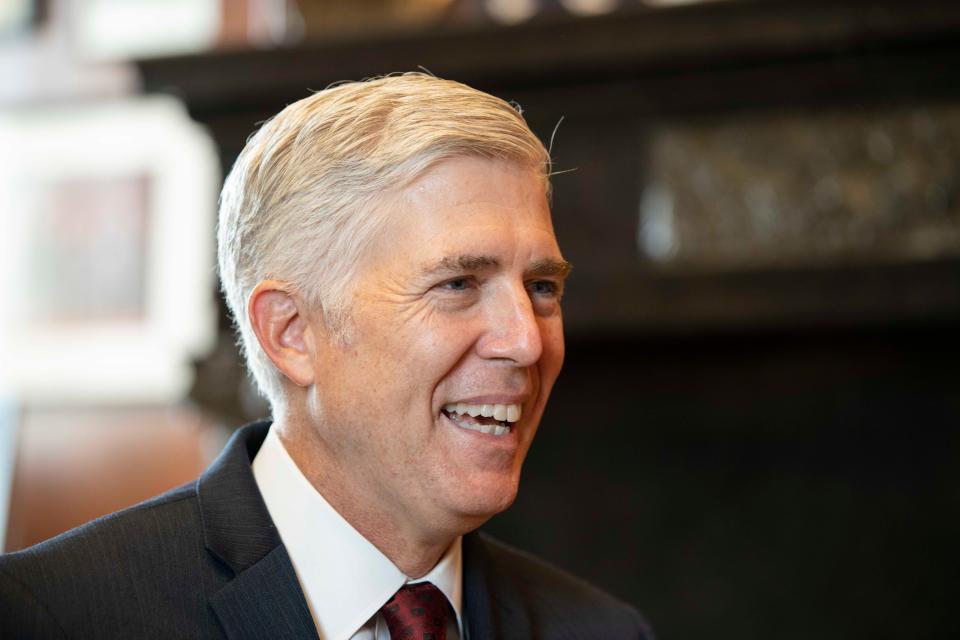Why Trump's critics are citing Justice Gorsuch in fight over ballots, insurrection
- Oops!Something went wrong.Please try again later.
- Oops!Something went wrong.Please try again later.
- Oops!Something went wrong.Please try again later.
WASHINGTON − As the legal battle over whether Donald Trump is eligible to appear on 2024 ballots moves − inevitably − toward the Supreme Court, one justice in particular is being singled out by the former president’s critics: his first nominee, Neil Gorsuch.
Maine Secretary of State Shenna Bellows, a Democrat, cited Gorsuch in her decision Thursday that Trump is ineligible to appear on that state’s ballot because of his role in the Jan. 6, 2021, attack on the U.S. Capitol. When the Colorado Supreme Court made a similar decision earlier this month, the justices also quoted Gorsuch.
Trump’s opponents have zeroed in on a short opinion Gorsuch wrote in 2012 when he was a judge on the U.S. Court of Appeals for the 10th Circuit – nearly five years before Trump named him to replace the late Justice Antonin Scalia. The case dealt with a presidential candidate who was struck from Colorado’s ballot because he was not, as the Constitution requires, a “natural born citizen.”
More: Native Americans are winning at the Supreme Court – with help from Justice Gorsuch
“As then-Judge Gorsuch recognized,” the majority in the Colorado Supreme Court decision wrote, citing a line from the 2012 opinion. “As now-Justice Gorsuch observed,” Bellows wrote in her decision, before quoting the same line.
Why Trump's critics are citing Gorsuch
Many experts predict the U.S. Supreme Court will resolve the ballot cases on limited grounds, avoiding central questions about whether Trump took part in an insurrection. Even if that’s true, quoting from one of the nine justices on the high court is a well-established tactic for advocates trying to build a five-vote majority.
Writing for a three-judge panel in 2012, Gorsuch dismissed the idea that Colorado was required to place Abdul Karim Hassan’s name on the presidential ballot even if he was ineligible to assume the presidency. A state’s “legitimate interest in protecting the integrity and practical functioning of the political process,” Gorsuch wrote, “permits it to exclude from the ballot candidates who are constitutionally prohibited from assuming office.”
What Gorsuch was saying, in other words, is states are empowered to assess a candidate’s eligibility for an office and strike them from the ballot if they don’t meet the criteria for holding office. The question raised in the Hassan case is just one part of the legal fight over Trump’s eligibility playing out in courts across the country today.
Colorado’s top court and Maine’s secretary of state both found Trump ineligible to serve under a Reconstruction-era provision of the 14th Amendment. That provision bars people who took an oath to uphold the Constitution and then took part in an insurrection from serving again.
Both paused the practical impact of their decisions until courts have a chance to review them. In Colorado, for instance, the state court said election officials should proceed as if Trump's name will appear on the ballot until the U.S. Supreme Court resolves the matter.
Who decides what's an insurrection?
The 4-3 majority of Colorado justices also noted a decision from a federal court that upheld California denying a place on the ballot for a 27-year-old presidential candidate because he was several years shy of meeting the Constitution’s 35-years-old age requirement. And they pointed to a decision by a federal court in Illinois that barred a 31-year-old from the presidential ballot.

Trump’s supporters counter that deciding whether a candidate took part in an insurrection is far more complicated – more of a judgment call – than determining whether they are natural-born citizen or meet the Constitution’s age requirement. That is a decision that ultimately should be left to Congress, they said, not election officials or even state courts.
The Colorado Republican Party has appealed to the U.S. Supreme Court and has asked for expedited review. Trump is expected to do so as well in coming days. If the nation’s top court agrees to hear the case, it could wind up resolving more than a dozen similar pending lawsuits across the country.
Trump nominated three of the current nine justices, Gorsuch, Brett Kavanaugh and Amy Coney Barrett. But he has a mixed post-presidency record, at best, at the high court. Last year, for example, the Supreme Court declined to hear Trump's appeal of a lower court decision allowing Congress to review White House records related to the Jan. 6 riot.
More recently, the justices sided with Trump just last week and declined to let special counsel Jack Smith leapfrog an appeals court decision on whether Trump may claim immunity from criminal charges tied to his alleged interference in the 2020 election.
This article originally appeared on USA TODAY: Why Trump's critics are quoting Justice Gorsuch in fight over 2024 ballots

